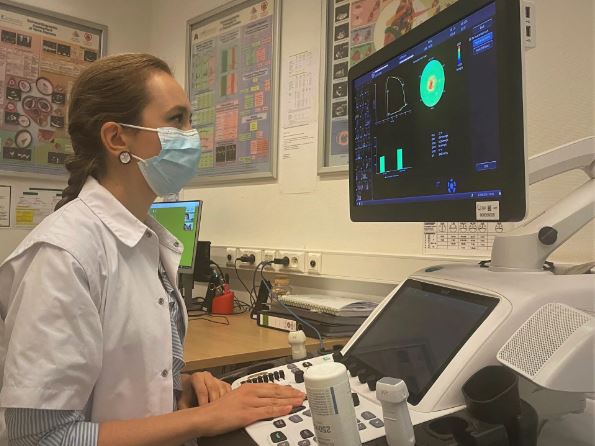About 30% of hospitalised Covid-19 patients have a heart defect one year after they were admitted for acute symptoms of the disease, a study by cardiologist Dr Maria Luiza Luchian at the Brussels University Hospital (UZ Brussel) shows.
While Covid-19 is predominantly a mild flu-like illness for most people, it can have a significant impact on the cardiovascular system, especially (but not only) in elderly patients with pre-existing heart or lung diseases and other chronic illnesses.
"The study shows that the absence of calcium in coronary arteries meant there was a lower cardiovascular risk for Covid-19 patients," said Luchian in a press release, explaining that a standard chest CT scan, with an assessment of the calcium score, can be a valuable tool to assess the risk of heart disease and mortality.
Simple method with significant advantages
Importantly, this method can be incorporated into all chest CT scans performed for various clinical questions, not just in Covid-19 patients. "The result may change the treatment strategy for the patients," she stressed.
"It is a simple method with significant advantages in the context of a global health crisis, with less consumption of financial resources, shorter examination time and lower exposure to radiation doses for the patients compared to other techniques known for the evaluation of calcium in the coronary arteries," Luchian added.
During the first Covid-19 wave, she followed up on 310 patients from the start of the acute infection, and at six and 12 months after their discharge from the UZ Brussel. "In almost a third of the patients, lung abnormalities were observed during chest CT examinations after six months, but these were not linked to the Long Covid or 'Lung Covid'," she said.
Related News
- New Omicron sub-variant now dominant in Belgium: What does this mean?
- United States' FDA launches study into surgical technique developed at UZ Brussel
These abnormalities were changes in levels of the cardiac troponin protein. The evolution of this protein could indicate various acute complications such as myocarditis (inflammation of the middle layer of the heart wall), myocardial infarction (heart attack) or arrhythmias (irregular heartbeat).
The researchers observed subtle changes in the heart muscle that "could be linked to the persistence of the symptoms, even in patients with no history of lung or heart disease," she said, adding that further analysis showed that heart pump function was slightly altered in these patients.
"In the long term, this could indicate an early occurrence of heart disease," Luchian added.

